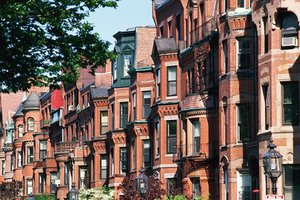Getting Your Neighborhood Historic District Designation. New Construction Homes for Sale in Clifton Park NY. Josh Gonzalez a Real Estate Agent with Coldwell Banker Prime Properties in Clifton Park NY.
Getting a historic designation for your neighborhood takes a lot of work. But it can increase property values and build a strong sense of community.

Getting a historic designation for your neighborhood can add value to your own home. Image: Hisham Ibrahim/Photographer's Choice RF/Getty Images
Getting Your Neighborhood Historic District Designation. New Construction Homes for Sale in Clifton Park NY. Josh Gonzalez a Real Estate Agent with Coldwell Banker Prime Properties in Clifton Park NY.
Getting a historic designation for your quaint old neighborhood is a paperwork-intensive task that requires neighborhood agreement, surveys, local official involvement, and perhaps a consultant.
But if you do the necessary research and pick a designation agreeable to everyone, the result can mean higher property values and access to grants and financial assistance for maintenance and repairs.
Best of all, you'll help preserve history.
Confusion abounds about what a designation does or doesn't allow, and opponents often wrongly believe any historic designation means they'll be penalized for changing a doorknob or window pane.
Getting Your Neighborhood Historic District Designation. New Construction Homes for Sale in Clifton Park NY. Josh Gonzalez a Real Estate Agent with Coldwell Banker Prime Properties in Clifton Park NY.
Paperwork takes time
If you and your neighbors volunteer to go through the designation process, your biggest expense will be time-and it could take six months or more, and at least 10 to 20 hours a week, depending on the size of your community.
You'll have to research homes' architecture, prove the neighborhood is historic, survey property lines, photograph homes and streetscapes, and enlist the help of local and state historic officials.
Hiring a consultant to do the job can cost $5,000 to $20,000 or more, but a pro can more easily navigate the tangle of paperwork and architectural terms, and discern what's truly historic about your community. There typically are no filing fees for historic designations, but photo processing costs can add up.
What's historic?
Historic generally means at least 50 years old, but that doesn't mean any old house automatically qualifies for a historic designation.
Some newer structures qualify if they're associated with major events, such as the Memphis, Tenn., motel where Martin Luther King Jr. was assassinated, says Christopher Eck, a historic preservation specialist with the U.S. General Services Administration in Atlanta.
You'll also need to consider architecture, neighborhood events, who lived there, and what the homes and neighborhood can teach. Kentucky, for example, was once full of log cabins. Now, the few that remain offer insight into life at that time, Eck says.
Gather the neighbors
Determining the boundaries of the district can be a touchy subject. Barbara Swartout, who has spearheaded the designation effort for several neighborhoods in New York's Finger Lakes region, suggests asking a community leader, such as your town's state representative, to choose district boundaries.
Once you've established boundaries, your local historical society or commission may be able to help notify owners about the designation effort.
As word of your efforts spreads, expect opposition. For a national designation, the majority of owners must approve. For a state designation, the neighborhood could be historic, yet an individual owner can decline to have his home listed. Local designations usually involve a town zoning board vote.
"It's a source of endless confusion," says Elizabeth Muzzey, a New Hampshire state historic preservation officer. "And it's a well-accepted fact that people will panic if you take the approach that they can't change anything on their houses" after a designation is in place.
Pick a designation
Designations differ, and the restrictions they impose vary widely. Options include local, state, and national designations.
A national designation is the most lenient. State designations vary, but tend to follow national requirements. Local designations are the most restrictive and usually are included in municipal preservation ordinances. Local laws can restrict paint colors, additions, and how features on a home such as windows or roofing are replaced.
The National Register of Historic Places, administered by the National Park Service, is considered the most prestigious designation. A National Register designation is honorary and doesn't limit what owners can do to their homes.
States also offer their own historic designations. State historic preservation officers typically oversee National Register and state-designated properties.
A local preservation ordinance can add a layer of protection by being more restrictive, Eck says. If your neighborhood wants additional protection, along with more restrictions, seek local and state designations. But be aware that most of the controversy over designation requirements arises at the local level, says Josh Rogers, executive director of the Historic Macon Foundation in Macon, Ga.
Property values
There's no guarantee that every home in a historic district will increase in value, but several studies indicate an overall rise in value for historic neighborhoods and areas surrounding a historic district.
A 2007 report by Jonathan Mabry, historic preservation officer for Tucson, Ariz., indicated an increase of 5% to 35% nationwide for designated homes in neighborhoods that earned historic designation.
And as controversial as local designations can be, homes with national and local designations tended to increase more in value than those with only a national title. That's largely because of the greater level of oversight and neighborhood involvement, according to the report. By: Terry Sheridan.
Getting Your Neighborhood Historic District Designation. New Construction Homes for Sale in Clifton Park NY. Josh Gonzalez a Real Estate Agent with Coldwell Banker Prime Properties in Clifton Park NY.

Comments(0)